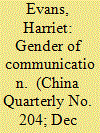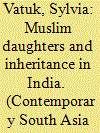|
|
|
Sort Order |
|
|
|
Items / Page
|
|
|
|
|
|
|
| Srl | Item |
| 1 |
ID:
101277


|
|
|
|
|
| Publication |
2010.
|
| Summary/Abstract |
In the flow of the material, cultural and moral influences shaping contemporary Chinese society, individual desires for emotional communication are reconstituting the meaning of the subject, self and responsibility. This article draws on fieldwork conducted in Beijing between 2000 and 2004 to discuss the gendered dimensions of this process through an analysis of the implications of the "communicative intimacy" sought by mothers and daughters in their mutual relationship. What could be termed a "feminization of intimacy" is the effect of two distinct but linked processes: on the one hand, a market-supported naturalization of women's roles, and on the other, the changing subjective articulation of women's needs, desires and expectations of family and personal relationships. I argue that across these two processes, the celebration of a communicative intimacy does not signify the emergence of more equal family or gender relationships, as recent theories about the individualization and cultural democratization of daily life in Western societies have argued. As families and kin groups, communities and neighbourhoods are physically, spatially and socially broken up, and as gender differences in employment and income increase, media and "expert" encouragement to mothers to become the all-round confidantes, educators and moral guides of their children affirms women's responsibilities in the domestic sphere. Expectations of mother-daughter communication reshape the meaning - and experience - of the individual subject in the changing character of the urban family at the same time as they reinforce ideas about women's gendered attributes and the responsibilities associated with them.
|
|
|
|
|
|
|
|
|
|
|
|
|
|
|
|
| 2 |
ID:
185578


|
|
|
|
|
| Summary/Abstract |
Islamic law gives women shares in the estate of a deceased parent, husband, and certain other relatives. However, in India they rarely obtain the inheritance shares to which they are entitled. When the time comes, they typically either waive their inheritance rights or are prevented by their male co-heirs from accessing them. Those who assert a claim to their shares find themselves vilified by their natal kin and by society at large, as greedy, grasping, selfish, unwomanly and lacking in family feeling. They are often even ostracized by their brothers, sisters-in-law, and other family members. Drawing upon data from interviews conducted in Delhi in 2011, I explore this gap in India between Islamic law and actual practice, with specific reference to a Muslim daughter’s right to inherit natal property.
|
|
|
|
|
|
|
|
|
|
|
|
|
|
|
|
|
|
|
|
|